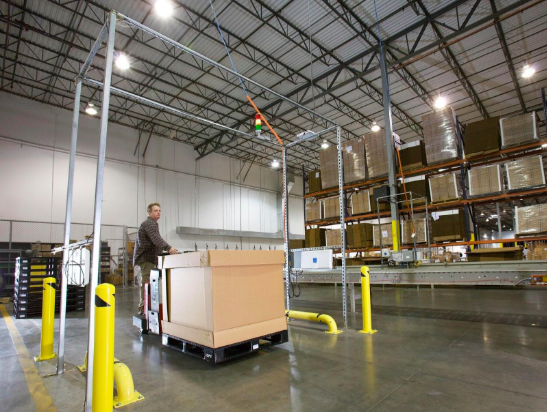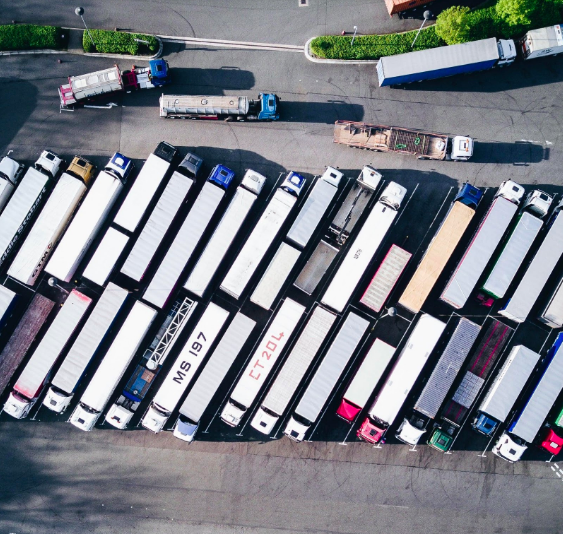Anyone in business knows that sales numbers sometimes seem like staggering amounts of money. A million pounds of apples sold at $1.68 per pound would appear to yield a princely $1.68 million. However, this number is deceptive because it doesn’t take into consideration the wholesale cost of the apples and what was spent getting them to the store. Given that the average net profit margin of a grocery chain is only 1.62 percent, the actual profit made off the million pounds of apples is around $27,000. That profit must outweigh your Total Cost of Business (TCOB), that is, the price of the product, transportation, employees, equipment, and overhead as well as intangibles like risk and worker safety.
Reducing your TCOB by even a percentage point can yield handsome returns. In our apple example, a percentage point saved returns about $17,000. Given that the U.S. grocery industry does $5.32 trillion in sales, reducing TCOB by even a small amount can yield great rewards. While there are operating costs that a company can’t control, many supply chain costs can be managed, and knowing how to reduce logistics costs on transportation and other areas of the supply chain is crucial for companies that want to be market leaders.
The Supply Chain Is the Key to Success for Top Companies

A Bain survey of industries found a consistent trait that distinguished top performing companies from their average competitors. The top performers spent only four percent of their revenues on their supply chains while the average in the industry was nearly ten percent. The survey itself was taken across industries and this metric held true for different types of companies, from automotive production to electronics to retail. The lesson is very clear: Reducing supply chain costs creates a clear market winner that dominates. A few reasons for this are:
- Competitiveness: A large part of a product’s final sale price derives from its transportation costs. Reducing these costs allow companies to offer their products to consumers for less while still making a profit, making them more attractive to consumers.
- Opportunities for Expansion: If a company is recouping more of the final sale price as profit then they increase the amount of money they can invest back into their business. This can allow a company to produce more product or diversify their product lines, enabling them to enter more markets and market segments.
- Greater Investment: If a company increases its profit margins, it can offer more value to its shareholders. This makes it more attractive to investors and yields more profit that it can put towards growth.
It’s not easy to make a single change to save money in your supply chain that won’t cost you more somewhere else.
All of these factors are connected. Greater competitiveness creates an opportunity for expansion, as does greater interest and investment from other companies. All of these benefits add up to a more resilient company that can weather what it can’t control—like a rise in fuel prices. A company with a firm handle on its supply chain costs may even be seen as a safe bet in difficult times like an economic downturn. The fact that market-leading companies spend less of their money on operating their supply chain isn’t a mystery. The real question is how they manage to do it.
Supply chains are complex structures that are generally not well understood by those outside of them, and it’s not easy to make a single change to save money that won’t cost you more somewhere else. One of the few changes that you can make that will lower your supply chain costs—and thus your TCOB—is the delivery platform your products are shipped on.
How to Reduce Logistic Costs on Transportation
In most supply chains, the old-fashioned wood pallet introduced in the 1920s is still the default shipping platform—even though a superior alternative is available. The wood pallets most of us are used to dealing with cause many unnecessary costs every day as a result of their weight, propensity to damage equipment, and maintenance requirements, all costs that could be avoided by switching to a superior plastic platform. Using a plastic pallet pooling program instead of wood pallets translates into savings on transportation through:
- Reduced Fuel Costs: Plastic pallets weigh less than 50 pounds, compared to around 70 pounds for a typical wood block pallet—and they provide greater strength for their weight. What this means for you is that more of the fuel you use is spent shipping product, not pallets. Given how much traveling is required for most products to reach a retail store, a lighter pallet results in savings that accumulates for every mile of road that is traveled. Trucks that weigh out, or are filled to weight capacity, get the benefit of more of that weight being salable product, resulting in a savings of $0.75-$1.08 per lighter plastic pallet. Trucks that cube out save on fuel, maximizing the returns for the cost of each shipment of goods transported.
- Reduced Equipment Maintenance: Lighter loads don’t just mean less fuel spent. They also mean less wear and tear on the equipment used to move product around. This applies both to the trucks that move product and to specialized warehouse equipment like forklifts and Automated Storage and Retrieval Systems.
- No Reverse Supply Chain: A plastic pallet pooling program means that the maintenance, sanitation, and delivery of the plastic pallets are handled for you. This eliminates the logistics and expense of running a parallel supply chain to get pallets where and when you need them.
All of these benefits combine to reduce the cost of the everyday operation of your supply chain, and they can be achieved simply by changing delivery platforms from a wood pallet to a plastic pallet. There’s no need to make changes to the timetables your company has developed over the years or make an expensive investment in new equipment or storage facilities. Plastic pallets like those offered by iGPS are built to the specifications laid out by the Grocery Manufacturers Association and work with existing supply chain equipment, offering cumulative savings without huge upfront investments.
To reduce your supply chain transportation costs, maximize your company’s profit margins, and grow your business with the iGPS plastic pallet, give our team a call at 1-800-884-0225, email us at switch@igps.net, or visit our contact page.
Image 1: Unsplash user Nigel Tadyanehondo
Image 2: Flickr CC user Seika



